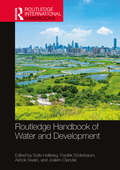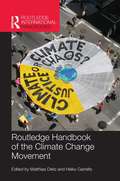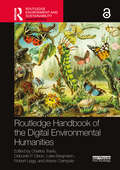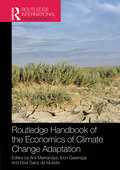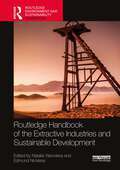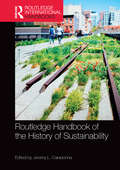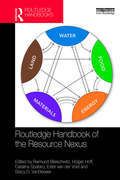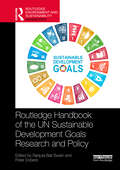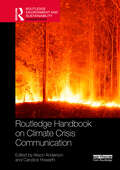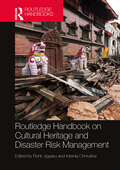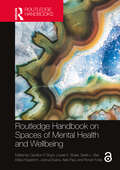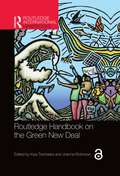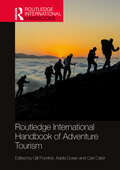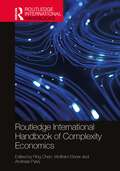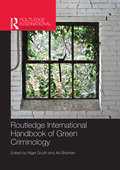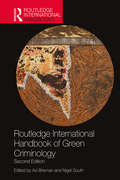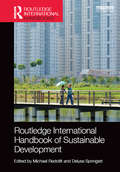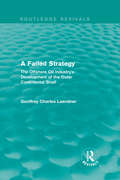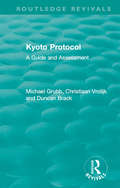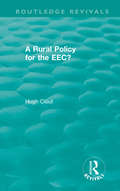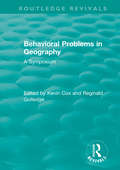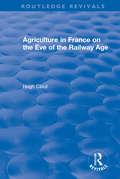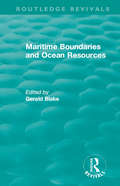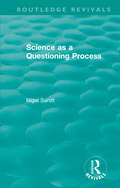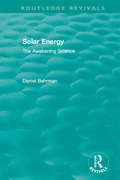- Table View
- List View
Routledge Handbook of Water and Development (Routledge International Handbooks)
by Fredrik Söderbaum Joakim Öjendal Sofie Hellberg Ashok SwainWater is essential for human life and at the centre of political, economic, and socio-cultural development. This Routledge Handbook of Water and Development offers a systematic, wide-ranging, and state-of-the-art guide to the diverse links between water and development across the globe. It is organized into four parts: Part I explores the most significant theories and approaches to the relationship between water and development. Part II consists of carefully selected in-depth case studies, revealing how water utilization and management are deeply intertwined with historical development paths and economic and socio-cultural structures. Part III analyses the role of governance in the management of water and development. Part IV covers the most urgent themes and issues pertaining to water and development in the contemporary world, ranging from climate change and water stress to agriculture and migration. The 32 chapters by leading experts are meant to stimulate researchers and students in a wide range of disciplines in the social and natural sciences, including Geography, Environmental Studies, Development Studies, and Political Science. The Handbook will also be of great value to policymakers and practitioners.
Routledge Handbook of the Climate Change Movement (Routledge Environment and Sustainability Handbooks)
by Matthias Dietz Heiko GarreltsThis handbook provides a comprehensive overview of the growing transnational climate movement. A dual focus on climate politics and civil society provides a hitherto unavailable broad and systematic analysis of the current global movement, highlighting how its dynamic and diverse character can play an important role in environmental politics and climate protection. The range of contributors, from well-known academics to activist-scholars, look at climate movements in the developed and developing world, north and south, small and large, central and marginal. The movement is examined as a whole and as single actors, thereby capturing its scope, structure, development, activities and influence. The book thoroughly addresses theoretical approaches, from classic social movement theory to the influence of environmental justice frames, and follows this with a systematic focus on regions, specific NGOs and activists, cases and strategies, as well as relations with peripheral groups. In its breadth, balance and depth, this accessible volume offers a fresh and important take on the question of social mobilization around climate change, making it an essential text for advanced undergraduates, postgraduate students and researchers in the social sciences.
Routledge Handbook of the Digital Environmental Humanities (Routledge Environment and Sustainability Handbooks)
by Luke Bergmann Charles Travis Deborah P. Dixon Robert Legg Arlene CrampsieThe Routledge Handbook of the Digital Environmental Humanities explores the digital methods and tools scholars use to observe, interpret, and manage nature in several different academic fields. Employing historical, philosophical, linguistic, literary, and cultural lenses, this handbook explores how the digital environmental humanities (DEH), as an emerging field, recognises its convergence with the environmental humanities. As such, it is empirically, critically, and ethically engaged in exploring digitally mediated, visualised, and parsed framings of past, present, and future environments, landscapes, and cultures. Currently, humanities, geographical, cartographical, informatic, and computing disciplines are finding a common space in the DEH and are bringing the use of digital applications, coding, and software into league with literary and cultural studies and the visual, film, and performing arts. In doing so, the DEH facilitates transdisciplinary encounters between fields as diverse as human cognition, gaming, bioinformatics and linguistics, social media, literature and history, music, painting, philology, philosophy, and the earth and environmental sciences. This handbook will be essential reading for those interested in the use of digital tools in the study of the environment from a wide range of disciplines and for those working in the environmental humanities more generally.
Routledge Handbook of the Economics of Climate Change Adaptation: Routledge Handbook Of The Economics Of Climate Change Adaptation (Routledge International Handbooks)
by Ibon Galarraga Anil Markandya Elisa Sainz de MurietaClimate change is one of the greatest challenges facing human kind owing to the great uncertainty regarding future impacts, which affect all regions and many ecosystems. Many publications deal with economic issues relating to mitigation policies, but the economics of adaptation to climate change has received comparatively little attention. However, this area is is critical and a central pillar of any adaptation strategy or plan and is the economic dimension, which therefore merits the increase in attention it is receiving. This book deals with the difficulties that face the economics of adaptation. Critical issues include: uncertainty; baselines; reversibility, flexibility and adaptive management; distributional impacts; discount rates and time horizons; mixing monetary and non-monetary evaluations and limits to the use of cost-benefit analysis; economy-wide impacts and cross-sectoral linkages. All of these are addressed in the book from the perspective of economics of adaptation. Other dimensions of adaptation are also included, such as the role of low- and middle-income countries, technology and the impacts of extreme events. This timely book will prove essential reading for international researchers and policy makers in the fields of natural resources, environmental economics and climate change.
Routledge Handbook of the Extractive Industries and Sustainable Development (Routledge Environment and Sustainability Handbooks)
by Natalia YakovlevaThe Routledge Handbook of the Extractive Industries and Sustainable Development provides a cutting-edge, comprehensive overview of current trends, challenges and opportunities for metal and mineral production and use, in the context of climate change and the United Nations Sustainable Development Agenda 2030. Minerals and metals are used throughout the world in manufacturing, construction, infrastructure, production of electronics and consumer goods. Alongside this widespread use, extraction and processing of mineral resources take place in almost every nation at varying scales, both in developing countries and major developed nations. The chapters in this interdisciplinary handbook examine the international governance mechanisms regulating social, environmental and economic implications of mineral resource extraction and use. The original contributions, from a range of scholars, examine the relevance of the mining industry to the United Nations Sustainable Development Goals (SDGs), reviewing important themes such as local communities Indigenous peoples, gender equality and fair trade, showing how mining can influence global sustainable development. The chapters are organised into three sections: Global Trends in Mineral Resources Consumption and Production; Technology, Minerals and Sustainable Development; and Management of Social, Environmental and Economic Issues in the Mining Industry. This handbook will serve as an important resource for students and researchers of geology, geography, earth science, environmental studies, engineering, international development, sustainable development and business management, among others. It will also be of interest to professionals in governmental, international and non-governmental organisations that are working on issues of resource governance, environmental protection and social justice.
Routledge Handbook of the History of Sustainability (Routledge Environment and Sustainability Handbooks)
by Jeremy L. CaradonnaThe Routledge Handbook of the History of Sustainability is a far-reaching survey of the deep and contemporary history of sustainability. This innovative resource will help to define the history of sustainability as an identifiable field. It provides a unique resource for advanced undergraduates, graduate students, and scholars, and delivers essential context for understanding the current state and future path of the sustainability movement. The history of sustainability is an increasingly important domain within the discipline of history, which draws on an interdisciplinary set of fields, ranging from energy studies, transportation, and urbanism to environmental history, economics, and philosophy. Key sections in this handbook cover the historiography of sustainability, resilience and collapse in historical societies, the deep roots of sustainability (seventeenth century to nineteenth century), the recent history of sustainability (twentieth century to present), and core issues and key debates in sustainability. This handbook is an invaluable research and teaching tool for those interested in the history and development of sustainability and an essential resource for the many sustainability studies programs that now exist in the world's universities.
Routledge Handbook of the Resource Nexus (Routledge Environment and Sustainability Handbooks)
by Holger Hoff Raimund Bleischwitz Catalina Spataru Stacy D. VanDeveer Ester Van Der VoetIn recent years the concept of the resource "nexus" has been both hotly debated and widely adopted in research and policy circles. It is a powerful new way to understand and better govern the myriad complex relationships between multiple resources, actors and their security concerns. Particular attention has been paid to water, energy and food interactions, but land and materials emerge as critical too. This comprehensive handbook presents a detailed review of current knowledge about resource nexus-related frameworks, methods and governance, including a broad set of inter-disciplinary perspectives. Written by an international group of scholars and practitioners, the volume focuses on rigorous research, including tools, methods and modelling approaches to analyse resource use patterns across societies and scales from a "nexus perspective". It also provides numerous examples from political economy to demonstrate how resource nexus frameworks can illuminate issues such as land grabs, mining, renewable energy and the growing importance of economies such as China, as well as to propose lessons and outlooks for sound governance. The volume seeks to serve as an essential reference text, source book and state-of-the-art, science-based assessment of this increasingly important topic – the resource nexus – and its utility in efforts to enhance sustainability of many kinds and implement the United Nations Sustainable Development Goals in an era of environmental and geopolitical change.
Routledge Handbook of the UN Sustainable Development Goals Research and Policy (Routledge Environment and Sustainability Handbooks)
by Ranjula Bali Swain Peter DobersThis handbook brings together a collection of seminal research on the Sustainable Development Goals (SDGs) and investigates the effectiveness of the 17 goals for achieving transformative change toward sustainable development. As a collection of inter- and transdisciplinary research from around the world, this volume explores the applications, implications, and best practices of the goals at thematic, regional, and national levels, providing specific examples from a diverse range of places, such as Australia, Brazil, China, DRC, India, Italy, the Sahel region of Africa, and the USA, among others. The book serves as a mid-term evaluation of the SDGs, bringing to the fore comprehensive experiences and evidence related to the SDGs, whilst highlighting the interlinkages between the different goals. The handbook is divided into two parts: Part I brings together groundbreaking research to define, identify, and present conceptual frameworks for a sustainable future, whilst Part II focuses on the policies, practices, and implementation of the SDGs. The chapters identify key aspects missing from the 2030 Agenda, such as global power imbalances, cultural diversity, Indigenous rights, and unsustainable levels of consumption; they also critically evaluate the overall delivery and effectiveness of the SDGs whilst outlining potential future directions for the post-SDG 2030 Agenda. This handbook is aimed at a diverse and global audience of academics and students of economics, business studies, political science, and development studies. It will also serve as a valuable reference for leaders in the industry, the public sector, civil society, and international policymakers keen to gain a better understanding of the SDGs.
Routledge Handbook on Climate Crisis Communication (Routledge Environment and Sustainability Handbooks)
by Alison Anderson Candice HowarthThis Handbook provides a state-of-the-art review of leading research on climate change communication. As climate change has moved further up the political agenda, the challenge of how to communicate the scientific, social, and political aspects of the climate emergency is of increasing interest to researchers, NGOs, governments, and policymakers at national and international levels. The Routledge Handbook on Climate Crisis Communication provides a concise and expert summary of this growing field, explaining the theoretical, conceptual, and empirical developments that have been made in recent years and describing the origins and connections to broader topics, including risk perception; environmental journalism; social media; and climate justice and activism. With contributions from leading international scholars, the book is divided into seven key parts, besides the Introduction chapter:Part One: Conceptual ChallengesPart Two: Methodological ConsiderationsPart Three: Communicating Climate Science across CulturesPart Four: Journalism and News ReportagePart Five: Activism and Social MovementsPart Six: Audiences and Popular CulturePart Seven: Future DirectionsTaking stock of the current landscape of climate change communication and helping to shape the field of inquiry going forward, this is a go-to guide for established and newly interested researchers, government and policymaking bodies, and students and their instructors.
Routledge Handbook on Cultural Heritage and Disaster Risk Management
by Ksenia Chmutina Rohit JigyasuThis Handbook provides a comprehensive and interdisciplinary overview of the intersections between cultural heritage and disaster risks. It serves as a defining reference, presenting the key concepts and policy arena that disaster risk management and cultural heritage currently operate. With 22 contributions from leading scholars and practitioners in the field, chapters explore the various contexts for cultural heritage and disaster risk management, illustrated through case studies from around the world. The Handbook is organised into 4 parts: Part 1 includes Disaster Risk Management and Cultural Heritage, Part 2 helps to Understanding the context, Part 3 focuses on the challenges and Part 4 delves deep into the future prospects. This Handbook provides insights a wide range of topics and themes, such as climate change, conflict, urbanisation, the role of community, and examines the relationships with a range of sectors such as governance and policy, finance, infrastructure, shelter, and urban planning. It also presents critiques on issues that are often taken for granted, including technocratic approaches, nature/culture binary, the romanticisation of traditional knowledges and the role of recovery and reconstruction. Insights into the future are also presented, and the Handbook concludes with a detailed agenda of proposed action to be taken in the field. Offering critical reflections on the topic, this book caters to students, researchers, professionals, and policy makers in the fields of disaster studies, cultural studies, heritage studies, conservation and geography.
Routledge Handbook on Spaces of Mental Health and Wellbeing
by Candice P. Boyd Ronan Foley Alak Paul Louise E. Boyle Sarah L. Bell Ebba Högström Joshua EvansThis handbook critically examines spaces of mental health and wellbeing across multiple, often intersecting, domains from green and blue spaces to lived and embodied spaces, creative spaces, work and home spaces, and institutional and post-institutional spaces.The Routledge Handbook on Spaces of Mental Health and Wellbeing features 45 chapters from leading international scholars who collectively interrogate the spatial dimensions of mental health and wellbeing from conceptual and experiential viewpoints. The ways in which these theoretical developments prompt a re-thinking of mental health and wellbeing as concepts is also discussed before presenting some highlights from the handbook’s five main sections – (1) green and blue spaces, (2) lived and embodied spaces, (3) creative spaces, (4) work and home spaces, and (5) institutional and post-institutional spaces. The key benefits of this book include a great appreciation of the complex networks and assemblages of mental health and wellbeing, the value of a geographical/spatial approach to thinking about mental health, and the vast array of spaces and places that are implicated in human and posthuman notions of wellbeing.This book will be of interest to students and scholars across the social sciences and the humanities as well as researchers and practitioners in the fields of psychology, psychiatry, social work, nursing, health geography, social and cultural geography, anthropology, mental health social studies, cultural theory, and architecture.
Routledge Handbook on the Green New Deal (Routledge International Handbooks)
by Kyla Tienhaara Joanna RobinsonIn recent years, the Green New Deal has moved from relative obscurity to front and centre of policy discussions and public debates about how to respond to the climate crisis. It has been credited with radically changing the nature of the conversation on climate change and with re-energizing the environmental movement at a critical time. All Green New Deal proposals share an emphasis on the need for governments (rather than markets) to lead the energy transition. However, they differ in other respects. This Handbook analyses the fundamentals underlying all Green New Deals as well as exploring national and regional variations. It is divided into three parts. The first part examines the political economy of the Green New Deal focussing not just on how proposals will be costed but also on opportunities for a fundamental transformation of both national economies and the global economic system. The second part explores issues of justice, which are central to many Green New Deal proposals, including Indigenous rights, racial and gender equity, and justice for the Global South. In the third part, authors detail case studies of Green New Deal proposals and plans at the local, national, and regional level. This book will be an invaluable research and reference volume for students and scholars in economics, politics, sociology, geography, and environmental studies. It should also be of interest to those actively involved in climate and environmental policymaking.
Routledge International Handbook of Adventure Tourism
by Carl Cater Gill Pomfret Adele DoranThis handbook presents the latest research, industry trends, developments and initiatives in adventure tourism. It explores conceptualisations of adventure tourism, historical and intellectual developments, insights into adventure tourists and the supply side of adventure tourism, and sustainable and inclusive adventure tourism.With contributions from leading international researchers, 28 chapters are organised into four thematic parts to provide a comprehensive overview of adventure tourism. The book presents core topics within the field as well as contemporary themes, debates and challenges within the industry. It adopts a multidisciplinary approach which draws on and applies current research from disciplines including tourism, recreation, sport and psychology to adventure tourism. As such, it presents different ways of examining this form of tourism, expands knowledge on recent developments and discusses the major claims in this field. It explores topics such as instantly accessible adventures, the increasing use of technology by adventure tourists and industry, and the well-being of tourists, destinations and communities. The handbook informs the reader of how literature translates into practice across different adventure tourism operations. It also investigates some of the key challenges affecting the adventure tourism industry and presents practical solutions and initiatives to overcome these. Case studies and vignettes are embedded throughout the handbook to illustrate practitioner perspectives, and each chapter includes learning outcomes and review questions to encourage readers to further consolidate their understanding.The handbook is intended for undergraduates, postgraduates, doctoral candidates and early-career and more established researchers interested in the fields of adventure tourism and related disciplines, such as adventure recreation, outdoor leadership and outdoor education. It is useful for industry organisations, policymakers, professionals and those working towards outdoor activity qualifications. It is also a valuable resource for supportingrelated modules on sustainable tourism, consumer behaviour and marketing in tourism.
Routledge International Handbook of Complexity Economics (Routledge International Handbooks)
by Thomas Berger James K. Galbraith W. Brian Arthur John B. Davis Wolfram Elsner Bernd Ebersberger Jean-Philippe Bouchaud Dirk Helbing Giovanni Dosi Hilton L. Root Jing Chen Mauro Gallegati Hardy Hanappi Andreas Pyka Frank Beckenbach Ping Chen Petra Ahrweiler Matthias Müller Alan Kirman Pier Paolo Saviotti Stan Metcalfe Harry Bloch Manuel Scholz-Wäckerle Dominik Hartmann Torsten Heinrich Roger A. McCain K. Vela Velupillai Anita Pelle Pete Barbrook-Johnson Michael Benzaquen Kristina Bogner Carlo Bottai Roy Cerqueti Silvano Cincotti Matteo Cinelli Matteo Coronese Johannes Dahlke Giovanna Ferraro Gaël Giraud Carina I. Hausladen César A. Hidalgo Martina Iori Antonio Iovanella Éva Kuruczleki Linyuan Lü Davide Luzzati Sheri M. Markose Xu Na Karl Naumann-Woleske Marcello Nieddu Marcelo C. Pereira Flávio L. Pinheiro Marco Raberto Roos, Michael W.M. Andrea Roventini Moura, Fernanda Senra de Max Sina Knicker Leilei Shi Y. N. Tang Paul Valcke Maria Enrica Virgillito Bing-Hong Wang Shuqi Xu Victor M. Yakovenko Marcell Zoltán VéghThe Routledge International Handbook of Complexity Economics covers the historical developments and early concerns of complexity theorists and brings them into engagement with the world today.In this volume, a distinguished group of international scholars explore the state of the art of complexity economics, and how it may deliver new and relevant insights to the challenges of the 21st century. Complexity science started in 1899 when Henri Poincaré described the three-body problem. The first approaches in economics emerged somewhat later, in the 1980s, driven by the Brussels-Austin school. Since then, complexity economics has gone through numerous developments: departing from linear simplifications, applying physical algorithms, to evolutionary economics and big data. This book covers the basic principles and methods, and offers an overview of the various domains—ranging from diverse fields of productivity studies, agricultural economics, to monetary economics—as well as the current challenges such as climate change, epidemics and economic inequality where complexity economics can provide insight. It closes with a review of complexity political economy and policy.Offering a vibrant alternative to orthodox economics, this handbook is a crucial resource for advanced students, researchers and economists across the disciplines of heterodox economics, economic theory and econophysics.
Routledge International Handbook of Green Criminology (Routledge International Handbooks)
by Avi Brisman Nigel SouthAcademic and general interest in environmental crimes, harms, and threats, as well as in environmental legislation and regulation, has grown sharply in recent years. The Routledge International Handbook of Green Criminology is the most in-depth and comprehensive volume on these issues to date. With contributions from leading international green criminologists and scholars in related fields, the Handbook examines a wide range of substantive issues, including: climate change corporate criminality and impacts on the environment environmental justice media representations pollution (e.g. air, water) questions of responsibility and risk wildlife trafficking The chapters explore green criminology in depth, its theory, history and development, as well as methodological concerns for this area of academic interest. With examples of environmental crimes, harms, and threats from Africa, Asia, Australia, Eastern Europe, South America, the United Kingdom, and the United States, this book will serve as a vital resource for international scholars and students in criminology, sociology, law and socio-legal studies, as well as environmental science, environmental studies, politics and international relations.
Routledge International Handbook of Green Criminology (Routledge International Handbooks)
by Avi BrismanThe Routledge International Handbook of Green Criminology was the first comprehensive and international anthology dedicated to green criminology. It presented green criminology to an international audience, described the state of the field, offered a description of a range of environmental issues of regional and global importance, and argued for continued criminological attention to environmental crimes and harms, setting an agenda for further study. In the six years since its publication, the field has continued to grow and thrive. This revised and expanded second edition of the Handbook reflects new methodological orientations, new locations of study such as Asia, Canada and South America, and new responses to environmental harms. While a number of the original chapters have been revised, the second edition offers a range of fresh chapters covering new and emerging areas of study, such as: conservation criminology, eco-feminism, environmental victimology, fracking, migration and eco-rights, and e-waste. This handbook continues to define and capture the field of green criminology and is essential reading for students and researchers engaged in green crime and environmental harm.
Routledge International Handbook of Sustainable Development (Routledge International Handbooks)
by Michael Redclift Delyse SpringettThis Handbook gives a comprehensive, international and cutting-edge overview of Sustainable Development. It integrates the key imperatives of sustainable development, namely institutional, environmental, social and economic, and calls for greater participation, social cohesion, justice and democracy as well as limited throughput of materials and energy. The nature of sustainable development and the book’s theorization of the concept underline the need for interdisciplinarity in the discourse as exemplified in each chapter of this volume. The Handbook employs a critical framework that problematises the concept of sustainable development and the struggle between discursivity and control that has characterised the debate. It provides original contributions from international experts coming from a variety of disciplines and regions, including the Global South. Comprehensive in scope, it covers, amongst other areas: Sustainable architecture and design Biodiversity Sustainable business Climate change Conservation Sustainable consumption De-growth Disaster management Eco-system services Education Environmental justice Food and sustainable development Governance Gender Health Indicators for sustainable development Indigenous perspectives Urban transport The Handbook offers researchers and students in the field of sustainable development invaluable insights into a contested concept and the alternative worldviews that it has fostered.
Routledge Revivals (1993): The Offshore Oil Industry's Development of the Outer Contintental Shelf
by Geoffrey C. LaendnerFirst published in 1993, this book traces and analyses the changing policies of American offshore oil companies concerning the exploration and development of the Outer Continental Shelf in the period from 1970 to 1976 — covering environmental legislation, the oil embargo, presidential initiatives, and proposed international laws. Where previous studies concerning the Outer Continental Shelf had only examined broad policy issues on an international level, this study focuses on those American offshore companies who were major actors in ocean affairs, especially in the exploration and development of the region.
Routledge Revivals: A Guide and Assessment (Routledge Revivals)
by Michael Grubb Duncan Brack Christiaan VrolijkOriginally published in 1999, The Kyoto Protocol provides a detailed discussion on the history, terms and implications of the Kyoto Protocol 1997. It explains the meaning of provision on emissions trading and other flexibility mechanisms, and provides a quantitative analysis using the Energy and Environment Programme's emissions trading model. It also contains the full text of the Kyoto Protocol and developments at the 4th Conference of the Parties in December 1998. This book will be of interest to academics working in the field of climate change, as well as the broader area of environment and sustainability.
Routledge Revivals: A Rural Policy for the EEC (Routledge Revivals)
by Hugh CloutFirst published in 1984, Hugh Clout’s work contributes to one of the most debated and important topics of the time, the European Economic Community. Starting from the Mid-20th century, Clout explains the profound socio-economic and environmental changes that effected the countryside of Western Europe. This work shows how the EEC’s wide-ranging Common Agricultural Policy added a measure of uniformity to farm policies. Clout reveals that the transformation however was not an entirely healthy one. The broad process of agricultural modernisation reinforced the numerical decline of farm workers throughout Western Europe, weakened many rural communities, and served to accentuate depopulation. Clout’s work ultimately argues forcibly that to produce such a programme for managing rural Europe would be a major challenge for the EEC in the future.
Routledge Revivals: A Symposium (Routledge Revivals #6)
by Kevin R. Cox Reginald G. GolledgeOriginally published in 1969, Behavioral Problems in Geography unpacks and identifies elements of behavioral models and theories. The book seeks to examine their specific effects on spatial activity and to operationalize some of the concepts previously used in a subjective and descriptive manner. All papers, are united by a common concern for the building of geographic theory regarding human behavior. Contributions in the volume vary a great deal in their emphasis ranging from philosophy and review, to theorizing and operationalization. Each paper recognizes the importance of examining the behavioural basis of spatial activity. This book will appeal to scholars of geography and psychology alike.
Routledge Revivals: Agriculture in France on the Eve of the Railway Age (Routledge Revivals)
by Hugh CloutFirst published in 1980, this compact and useful book uses the earliest volumes of government-published statistics, and with the aid of computer-generated cartography, transforms the numbers there reported into an arrondissement-by-arrondissement comparative picture of French agriculture in the mid-1830s. Clout reviews problems of rapid population growth, scarcely adequate domestic food supplies and primitive systems of transportation, while attention is drawn to spatial variations in agricultural activity and productivity. Commercial, high-yielding farming was best developed in a northern multi-nuclear region, comprising of Ile-de-France, Normandy and Nord, with smaller foci of commercial orientation along an eastern axis from Alsace to Marseilles and in western areas from the Loire to the middle of the Garonne valley. Clout concludes that the revolutionary promise of national economic unity was far from being realised in the 1830s and was not to be achieved until national systems of transport and education were firmly established later in the nineteenth century.
Routledge Revivals: Maritime Boundaries and Ocean Resources (Routledge Revivals)
by Gerald BlakeFirst published in 1987, Maritime Boundaries and Ocean Resources is a collection of essays which examines the political jurisdiction of ocean boundaries and the affects that this has on the world’s oceans. It examines how the intensification of ocean use has raised questions of how rational planning, and the management of the oceans can avoid increasingly environmental damage and sea use conflict and examines the ocean as a tool for space, trade and communication. It also addresses the creation of integrated regional planning for ocean management.
Routledge Revivals: Science as a Questioning Process (Routledge Revivals)
by Nigel SanittFirst published in 1996, Science as a Questioning Process evaluates scientific theories through from Darwinian evolution to relativity, and from quantum theory to cosmology. It offers an examination of these theories, in terms of a compromise between resolvable empirical questions, and theoretical questions left unresolved. The book asks questions that deal with both intellectual and public concern about what science tells us, and how reliable it is. Through this novel perspective, the book examines science in the context of everyday culture and the role it plays in everyday life. This book will be of interest to anyone working in the fields of philosophy, sociology and science.
Routledge Revivals: The Awakening Science (Routledge Revivals)
by Daniel BehrmanOriginally published in 1979, Solar Energy provides a tour of the world of solar energy and asks two key questions: is solar energy the key to the future of our energy needs, and what are the facts and potential of this source of renewable power. The book examines solar energy from the past, to modern plans for designing domestic solar housing, and looks at the sites and the technology applied to harness the Sun's power, such as the energy potential of windmills and the equatorial oceans. Behrman reports on the progress of scientists and manufacturers in making solar energy a viable competitor in the energy market, and studies the projections of a future energy crop for energy plantations.
